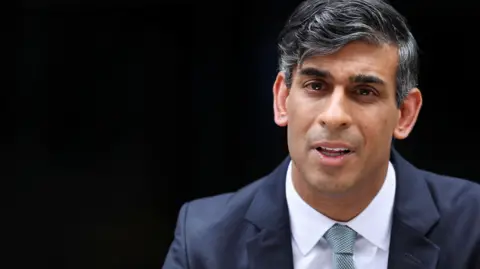In a recent incident highlighting the alarming issue of hate speech in the public sphere, Liam Shaw, a 21-year-old resident of Birkenhead, Merseyside, was sentenced for sending racist death threats to former Prime Minister Rishi Sunak. The charges stemmed from two emails sent on June 15, 2024, when Shaw utilized a public communication network to express violent and derogatory sentiments aimed at Sunak, who was serving as the UK Prime Minister at the time. This serious breach of propriety and civility was addressed by the Crown Prosecution Service (CPS), which confirmed that Shaw admitted to the charges against him.
The threatening messages were first identified by Sunak’s personal assistant, who reported them to law enforcement officials. The CPS described the language in the emails as being “racist, offensive and suggested Mr. Sunak should be killed by the public.” These acts of intimidation prompted a swift reaction from law enforcement, culminating in Shaw’s arrest in September 2024. During the police inquiry, investigators traced the emails back to his phone and his temporary accommodation in Birkenhead, which led to charges being filed against him for sending offensive and menacing messages.
Shaw appeared at Liverpool Magistrates’ Court, where he was sentenced to 14 weeks of imprisonment, which was subsequently suspended for a period of 12 months. Along with this, the court mandated Shaw to complete 20 days of rehabilitation activities and a six-month drug rehabilitation program, recognizing the necessity for both accountability and support in addressing his behavior. In addition to these conditions, Shaw was placed under a restraining order that prohibits any contact with Rishi Sunak or the offices connected to him for a duration of two years.
During the sentencing process, District Judge Timothy Boswell commented on the gravity of Shaw’s actions. He emphasized that access to a constituency Member of Parliament (MP) is an essential element of a functioning democracy, and abusing that access poses significant risks to the democratic process. Boswell argued that such misuse is a serious aggravating factor, urging the importance of holding individuals accountable for actions that undermine democratic principles.
Matthew Dixon of the CPS articulated a strong stance against the racist undertones of Shaw’s communications. He stressed that, while the right to freedom of expression is crucial in democratic societies, it does not extend to promoting violence and hatred against individuals, particularly those in public office. Dixon’s comments serve as a reminder of society’s collective responsibility to actively oppose racist abuse and threats, highlighting an ongoing commitment to uphold civil decency, especially within a diverse and pluralistic framework.
Shaw’s justification for his actions—claiming he likely sent the emails while intoxicated—sheds light on a troubling trend in which individuals may attempt to absolve themselves of responsibility due to impaired judgment. This defense was met with skepticism by the court, reinforcing the notion that accountability should not waver, irrespective of the circumstances under which such harmful actions are perpetrated.
Such incidents underline the critical need for stronger measures to combat hate speech and promote a climate of respect and tolerance across society. The sentencing of Liam Shaw serves as a poignant cautionary tale, urging individuals to reconsider the implications of their words and the potential harm they may inflict on others. As public discourse increasingly crosses into the realm of aggression and hostility, the collective efforts to foster a just and inclusive society remain paramount.










